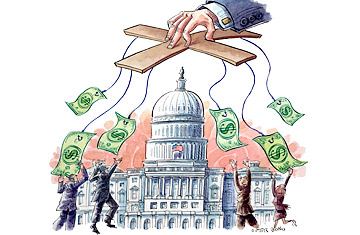
In his new book, Capitalism 4.0, economist Anatole Kaletsky argues that capitalism has gone through three major eras punctuated by two near-death crises — the Great Depression of the 1930s and the stagflation of the 1970s — which forced the system to adapt in order to survive. In the aftermath of the Great Recession, he says, capitalism is morphing into a new, fourth era. Kaletsky spoke to TIME about what went wrong with the global economic system — and how to fix it.
What will be the defining feature of capitalism 4.0?
In the fourth era we are going to recognize that both governments and markets can, at times, make serious — sometimes catastrophic — mistakes. There was a view after the Depression that markets were dangerous and needed to be tamed by an all-knowing, benign government. In the third phase [before the Great Recession] there was a reversal: the idea was that markets are perfect and governments need to be tamed. Now we know that both government and markets make mistakes, and we won't trust either of them.
But they also must work together?
Exactly. Distrust of both government and markets may seem very paralyzing, but actually it can be quite empowering. If you recognize fallibility, the obvious conclusion is that there is scope for improving both the functioning of government and of markets. We have two systems: a political system run by government and an economic system run by markets, and we have to find ways for the two of them to collaborate in a system of checks and balances.
Government clearly has a role in a market economy, though, despite 30 years of free-market policies.
The U.S., more than any other country in the world, is ultimately a pragmatic society, where what wins politically is what works economically. And the crisis has made it fairly clear that the deregulated, noninterventionist model of capitalism can't cope with extreme fluctuations. America will pragmatically conclude there is a need to invent a new system, crucially one in which government is necessary.
You worry that the recovery could be upended by governments trying to cut their deficits and raise taxes too quickly. Isn't that exactly what we're seeing now?
What we are seeing now is a kind of backsliding toward a pre-crisis position where it was assumed that markets can take care of themselves and the economy will be self-stabilizing. But it's become pretty clear that the private sector, both in America and in Europe, is still trying to pay down debt and cut spending. In that situation, a capitalist economy is not self-stabilizing, and government — either directly through fiscal policy, or indirectly through central banks and monetary policy — has got to compensate for that. But if households and private companies are spending less, and governments decide they've also got to spend less because they can't afford to run up larger deficits, then that is a sure formula for depression.
Would another round of stimulus be helpful?
Yes, but there is another alternative: monetary policy. Central banks could do more. We already have short-term interest rates near enough to zero all over the world. But there is still a view that this is a temporary emergency situation that isn't going to last very long. What central banks can do — and I think will do — in the next several months is offer clear assurances that interest rates are going to be at or near zero for many years to come, perhaps the rest of the decade. If the private sector begins to believe that very, very low interest rates are a permanent fact of life, companies will start to invest again on that basis. That's really the most plausible formula for a return to decent economic growth all over the world.
